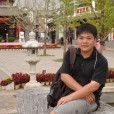鄺棟明,男,漢族,廣東珠海人,中山大學教授。研究方向為腫瘤免疫編輯與疾病進展。
基本介紹
- 中文名:鄺棟明
- 國籍:中國
- 民族:漢
- 出生地:廣東珠海
- 畢業院校:中山大學
- 學位/學歷:博士
- 專業方向:細胞生物學、腫瘤免疫學
- 主要成就:國家傑出青年基金獲得者
- 職稱:教授
- 性別:男
人物經歷,研究方向,講授課程,學術成就,概況,論文專著,
人物經歷
2009年6月獲中山大學理學博士學位,7月破格晉升中山大學副教授;
2010年獲“中國免疫學會青年學者獎”;
2011年獲全國百篇優秀博士學位論文獎;
2012年晉升教授、獲博士生指導資格;
2013年獲廣東“省傑青”項目、獲教育部和廣東省自然科學一等獎(第二完成人);
2014年獲國家優秀青年基金項目資助、獲國家自然科學二等獎(第三完成人);
2020年獲國家傑出青年基金項目資助。
研究方向
腫瘤免疫編輯與疾病進展;
炎性免疫微環境;
B細胞生物學功能;
腫瘤相關體液免疫反應網路。
講授課程
腫瘤生物學
細胞生物學實驗室
新生研討課
科研技能訓練(逸仙學院)
學術成就
概況
(一)獲獎情況
① 2010年 獲中國免疫學會青年學者獎;
② 2011年 獲全國優秀博士學位論文獎;
③ 2013年 獲教育部高等學校科學研究優秀成果獎一等獎(第二)、廣東省自然科學技術獎一等獎(第二);
④ 2014年 獲國家自然科學獎二等獎(第三)。
(二)學術任職
① 廣東省免疫學學會理事;
② 中國病理生理學會腫瘤專業委員會青年委員;
③ 中國醫師協會臨床精準醫療專業青年委員;
④ 中國免疫學會會員、美國免疫學學會會員、美國癌症學會會員。
(三)近年學術成績
近年來,以肝癌為主要模型,來研究間質免疫細胞與癌細胞之間的相互作用和潛在機制,探討以間質免疫細胞(重點為B淋巴細胞和巨噬細胞)作為腫瘤分子分期和治療靶標的可行性;
作為通訊和第一作者在Cancer Discov、J Clin Invest、J Exp Med、Hepatology、Blood、J Hepatol、J Pathol、Oncoimmunology和J Immunol等發表論文17篇(通訊11篇),總SCI影響因子大於200,SCI他引1200餘次。
論文專著
十篇代表性SCI論文(*為通訊作者; IF為SCI影響因子)
【1】Ouyang FZ, Wu RQ, Wei Y, Liu RX, Yang D, Xiao X, Zheng L, Li B, Lao XM*, Kuang DM*. 2017. Dendritic cell-elicited B-cell activation fosters immune privilege via IL-10 signals in hepatocellular carcinoma. Nat Commun 7:13453.(IF:12.4).
【2】Chen MM, Xiao X, Lao XM, Wei Y, Liu RX, Zeng QH, Wang JC, Ouyang FZ, Chen DP, Chan KW, Shi DC, Zheng L, Kuang DM*. 2016. Polarization of Tissue-Resident TFH-Like Cells in Human Hepatoma Bridges Innate Monocyte Inflammation and M2b Macrophage Polarization. Cancer Discov 6:1182-95.(IF:24.4)
【3】 Xiao X, Lao XM, Chen MM, Liu RX, Wei Y, Ouyang FZ, Chen DP, Zhao XY, Zhao Q, Li XF, Liu CL, Zheng L, Kuang DM*. 2016. PD-1hi Identifies a Novel Regulatory B-cell Population in Human Hepatoma That Promotes Disease Progression. Cancer Discov 6:546-59.(IF:24.4)
【4】 Liu RX, Wei Y, Zeng QH, Chan KW, Xiao X, Zhao XY, Chen MM, Ouyang FZ, Chen DP, Zheng L, Lao XM, Kuang DM*. 2015. Chemokine (C-X-C motif) receptor 3-positive B cells link interleukin-17 inflammation to protumorigenic macrophage polarization in human hepatocellular carcinoma. Hepatology 62:1779-90.(IF:14.1)
【5】 Li XF, Chen DP, Ouyang FZ, Chen MM, Wu Y, Kuang DM*, Zheng L*. 2015. Increased autophagy sustains the survival and pro-tumorigenic effects of neutrophils in human hepatocellular carcinoma. J Hepatol 62:131-9.(IF:14.9)
【6】Kuang DM*, Xiao X, Zhao Q, Chen MM, Li XF, Liu RX, Wei Y, Ouyang FZ, Chen DP, Wu Y, Lao XM, Deng H, Zheng L*. 2014. B7-H1-expressing antigen-presenting cells mediate polarization of protumorigenic Th22 subsets. J Clin Invest 124:4657-67. (IF:13.3)
【7】Kuang DM, Zhao Q, Wu Y, Peng C, Wang J, Xu Z, Yin XY, Zheng L*. 2011. Peritumoral neutrophils link inflammatory response to disease progression by fostering angiogenesis in hepatocellular carcinoma. J Hepatol 54:948-55.(IF:14.9)
【8】Kuang DM, Peng C, Zhao Q, Wu Y, Chen M, Zheng L*. 2010. Activated monocytes in peritumoral stroma of hepatocellular carcinoma promote the expansion of memory T helper 17 cells. Hepatology 51:154-64.(IF:14.1)
【9】Kuang DM, Zhao Q, Peng C, Xu J, Zhang JP, Wu C, Zheng L*. 2009. Activated monocytes in peritumoral stroma of hepatocellular carcinoma foster immune privilege and disease progression through PD-L1. J Exp Med 206:1327-37.(IF:10.8)
【10】Kuang DM, Wu Y, Chen N, Cheng J, Zhuang SM, Zheng L. 2007. Tumor-derived hyaluronan induces formation of immunosuppressive macrophages through transient early activation of monocytes.Blood 110:587-95.(IF:15.1)

